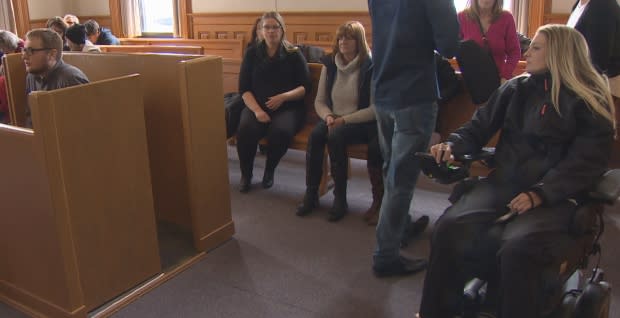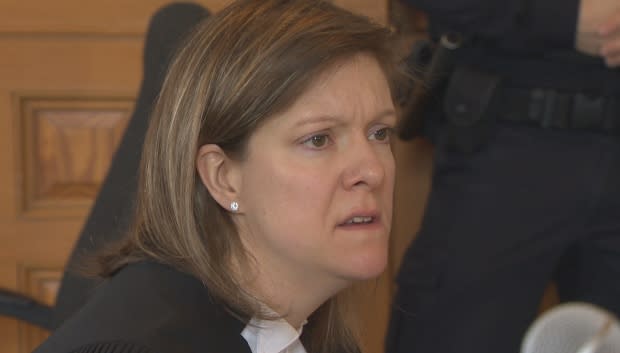Credibility central to Paradise man's dangerous driving, forcible confinement trial
The trial for a man accused of dangerous driving in a crash that paralyzed his ex-girlfriend comes down to what happened in the minutes before his car left Pitts Memorial Drive and rolled on March 20, 2017.
On Friday, the court heard from lawyers for the driver, Joshua Steele-Young, and his passenger, Morgan Pardy, about their two different versions of the events leading up to the crash.
Each lawyer highlighted the parts they say are most important.
What's not disputed
Both Steele-Young, now 23, and Pardy agreed that at the time of the crash, they had recently broken up and were having a loud, vicious argument as the car sped down the snowy highway.
Police estimated it was going 130 km/h before it skidded off the road and rolled.

Pardy was thrown from the car and sustained what Crown lawyer Jennifer Lundrigan described as "catastrophic injuries."
Her lungs and liver were damaged, and her spine injured to the extent that, two years later, she is still unable to walk.
Steele-Young faces two charges: dangerous driving causing bodily harm and forcible confinement.
Driver at fault?
Lundrigan argued it was clearly Steele-Young's driving that caused Pardy's injuries.

"His driving doesn't have to be the sole cause of her harm. It just has to be a contributing factor, and I submit that it certainly was," said Lundrigan.
Defence lawyer Randy Piercey disputed this, and Steele-Young testified that the crash happened after Pardy pushed his elbow.
"The push on the arm from Pardy severed the link between Steele-Young's driving and the bodily harm the crash caused," Piercey said.
But Pardy's lawyer contended there was a push from Pardy that caused the crash.
"She denies pushing him with any force. It doesn't make sense that she would interfere with his driving at that speed," said Lundrigan.
"Steele-Young's evidence was not credible. The evidence of the pushing of his arm is not credible. It doesn't make sense that you would push someone's arm when their driving was terrifying you."

Forcible confinement questioned
Differing testimonies, regarding whether or not Pardy asked to get out of the car, are difficult to reconcile.
Pardy testified that frightened by Steele-Young's erratic driving, she unfastened her seatbelt and repeatedly and loudly demanded that he let her out of the car on the side of highway.
"Pardy said she was terrified and was willing to walk home in the snow. She said she screamed and yelled, 'Let me out of the effing car,'" Lundrigan told the court.
"He could have let her out. He had numerous opportunities to do that, but he refused."
But Steele-Young testified Pardy never once asked him to let her out of the car.
He said they were screaming at each other as rap music blared in the car, adding that the music was so loud he never heard Pardy's seatbelt alarm go off after she unfastened it.

Piercey said Pardy's testimony was inconsistent, and that Steele-Young consistently said that Pardy never asked him to get out of the car.
"The Crown has to establish that she asked to get out and he refused," Piercey said.
Piercey also said if it's established that Pardy asked to leave and his client refused, then it has to be established he had malevolent intent, and that there was a reasonable place to stop.
Justice Frances Knickle said she will have to make decisions regarding the credibility of Pardy and Steele-Young "because there are divergences in their testimonies."
Knickle is expected to give her decision when the case returns to Supreme Court in late July.
Read more articles from CBC Newfoundland and Labrador

